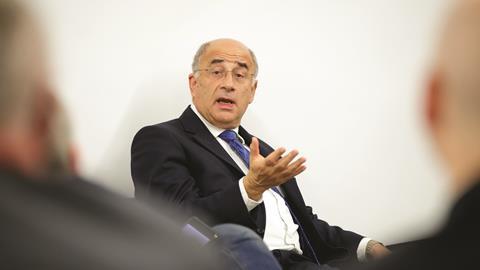Sir Brian Leveson warns that the criminal justice system faces collapse if the government does not adopt the ‘broad thrust’ of his proposals. Spending more money or increasing sitting days simply won’t cut it
When former Queen’s Bench Division president Sir Brian Leveson was commissioned by the government last December to come up with ‘once in a generation’ reform to speed up justice, the Crown court backlog reached what was then a record 74,651 cases. When he unveiled his radical blueprint in July, the backlog had climbed to 78,329.
Asked what was being done to turn the tide, courts minister Sarah Sackman told the Commons chamber on Tuesday that the government’s response to the Leveson review will be published ‘in due course’. Across the road in Portcullis House, the review’s author was telling the House of Commons justice select committee that if the government rejects the ‘broad thrust’ of his recommendations, the criminal justice system will collapse.
While recommendations such as greater use of out-of-court resolutions have been welcomed by the legal profession, measures that would drastically curtail the number of jury trials have caused alarm.
Sir Brian’s response? The system cannot survive as it currently stands. ‘What I have said to the bar and Law Society and others who say “well, a bit more money and more sitting days will solve this” – it won’t… If you look at just increasing sitting days, which is what the Bar Council have suggested, there are far too many ineffective cases because there isn’t a prosecutor or a defence lawyer in court. So if you increase the number of sitting days, you are going to increase the number of cases where there isn’t a barrister or a solicitor in court available to prosecute or defend the case. Just increasing the number of sitting days doesn’t get you over the problem. Equally, there is a limit to the number of days we’ve got for judges.’
When Sir Brian began his career at the bar in 1970, he did two cases a day and vividly remembers starting a third while two juries were out deliberating. Now, he said, no case takes less than a day due to its complexity. ‘The second question that I would ask the bar and Law Society is, “if not this, then what?” How are you going to cope? Because the present system, which deprives victims, witnesses and defendants of a trial within years, simply isn’t sustainable in my view.’
On the shortage of lawyers to defend and prosecute cases, the answer to that particular crisis will come in part two of the Leveson review. Sir Brian did, however, provide spoilers.
‘It’s clear from part one, the criminal law has become less attractive for legal professionals… If you look at the statistics of the number of criminal legal aid solicitors, there are some who start young and there are some very old. The old are dropping off. The young are moving on and they are doing other work. So they are getting involved in public inquiries, regulatory work, both of which are rather better paid than crime.’
'The present system, which deprives victims, witnesses and defendants of a trial within years, simply isn’t sustainable in my view'
Sir Brian Leveson
Remuneration must be looked at, Sir Brian said, because it is a ‘critical part’ of the system.
‘One of the challenges has been the way justice has been the subject of austerity measures, substantially reducing the amount of money that goes into the system. You will have your own understanding of the reasons for that, but the impact is it’s not as attractive a field of work.
‘It damages our democracy if we don’t have a mechanism promptly and fairly to ensure people are tried and that their complaints of criminal misbehaviour are addressed, whether that is a RASSO [rape and sexual violence] victim or a victim of fraud or whatever crime you want to identify.’
Experienced criminal judges are needed because some of the cases are exceptionally complex and difficult, Sir Brian added. ‘We need to look at how we’re appointing judges and how we’re allocating their work, which has its own problems. We’ve got to be aware of their mental wellbeing as well.’
Sir Brian recalled, when he was president of the Queen’s Bench Division, dealing with a circuit judge who tried 14 rape cases on the trot. ‘Well, that’s just not terribly helpful or healthy and causes stress and anxiety and mental ill health,’ he said.
The system needs to be looked at ‘holistically, as a whole’, Sir Brian stressed – hence, why he stated in part one of his review, that his recommendations must not be approached as a ‘pick-n-mix’ series of options.
Leveson told the committee he is keen to see the government’s response to part one as ‘it impacts’ on part two, on criminal courts efficiency, which is still in the works.
This article is now closed for comment.





































5 Readers' comments